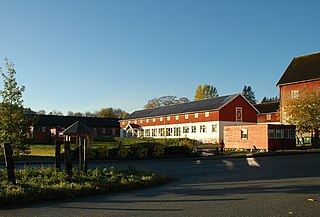
An ecovillage is a traditional or intentional community with the goal of becoming more socially, culturally, economically, and/or ecologically sustainable. An ecovillage strives to produce the least possible negative impact on the natural environment through intentional physical design and resident behavior choices. It is consciously designed through locally owned, participatory processes to regenerate and restore its social and natural environments. Most range from a population of 50 to 250 individuals, although some are smaller, and traditional ecovillages are often much larger. Larger ecovillages often exist as networks of smaller sub-communities. Some ecovillages have grown through like-minded individuals, families, or other small groups—who are not members, at least at the outset—settling on the ecovillage's periphery and participating de facto in the community. There are currently more than 10,000 ecovillages around the world.

An intentional community is a voluntary residential community which is designed to have a high degree of social cohesion and teamwork. The members of an intentional community typically hold a common social, political, religious, or spiritual vision, and typically share responsibilities and property. This way of life is sometimes characterized as an "alternative lifestyle". Intentional communities can be seen as social experiments or communal experiments. The multitude of intentional communities includes collective households, cohousing communities, coliving, ecovillages, monasteries, survivalist retreats, kibbutzim, Hutterites, ashrams, and housing cooperatives.

Gipton is a suburb of east Leeds, West Yorkshire, England, between the A58 to the north and the A64 to the south.
Endeavour Foundation is a not-for-profit charity headquartered in Brisbane, Queensland, Australia. It is one of the largest disability service providers in Australia, employing over 1800 staff and supported by 1200 volunteers.
The Camphill Movement is an initiative for social change based on the principles of anthroposophy. Camphill communities are residential communities and schools that provide support for the education, employment, and daily lives of adults and children with developmental disabilities, mental health problems, or other special needs.

Heeley City Farm is a city farm in the district of Heeley, Sheffield, South Yorkshire, England. It is a community-based and led training, employment and youth enterprise.

Bieldside is a suburb to the west of Aberdeen City Centre, Scotland. Together with the neighbouring suburb of Cults, it is the wealthiest area in Scotland. It has one pub/restaurant, The Bieldside, a foodstore, a hairdresser, a tea room and a charity shop. The Old Deeside railway line passes through Bieldside, and Queen Victoria would often stop at Bieldside on her regular journeys between her summer retreat at Balmoral and the city centre.
Karl König was an Austrian paediatrician who founded the Camphill Movement, an international movement of therapeutic intentional communities for those with special needs or disabilities.

Rotvoll is a neighbourhood in the city of Trondheim in Trøndelag county, Norway. It is located in the borough of Charlottenlund. It is located next to the Trondheim fjord between Leangen to the west and Grillstad to the east.
Barney Platts-Mills was a British film director, best known for his award-winning films, Bronco Bullfrog and Private Road.
Jairos Jiri MBE was born in the district of Bikita, then Southern Rhodesia now Zimbabwe. He was also known respectfully as Baba, which means Father in his Shona culture.
Camphill Svetlana Village is a therapeutic intentional community of nearly 40 residents in Russia serving people with special needs or disabilities. It was established in 1992 and is part of the international Camphill Movement.

Mary Caroline Richards was an American poet, potter, and writer best known for her book Centering: in Pottery, Poetry and the Person. Educated at Reed College, in Portland, Oregon, and at the University of California at Berkeley, she taught English at the Central Washington College of Education and the University of Chicago, but in 1945 became a faculty member of the experimental Black Mountain College in North Carolina where she continued to teach until the end of the summer session in 1951.

Brandon Trust is a United Kingdom charitable organization working with and for people with learning disabilities. They focus on helping people with said disabilities to live life how they want to.
Autism Plus is charity in England, United Kingdom. An Autism specialist charity, they offer support to adults and young people with autism autistic, learning disabilities and mental health conditions.
Thomas Weihs was an Austrian doctor and special needs educator, one of the founders of the Camphill Movement and a pioneer of Anthroposophical curative education.
The Garvald Centres are a group of six affiliated but independent Scottish charities that support people with special needs and learning disabilities. It is based on the work of the Austrian esotericist Rudolf Steiner. The charities operate in the Midlothian, Scottish Borders and Edinburgh area of Scotland.

Sir Robert George Martin was a New Zealand disability rights activist who promoted the self advocacy movement internationally and was involved in the proceedings resulting in the United Nations Convention on the Rights of Persons with Disabilities. He was a member of the United Nations Committee on the Rights of Persons with Disabilities from 2017 until his death.
The Queen's Award for Enterprise: Sustainable Development is awarded each year on 21 April by Queen Elizabeth II, along with the other two Queen's Awards for Enterprise categories.










